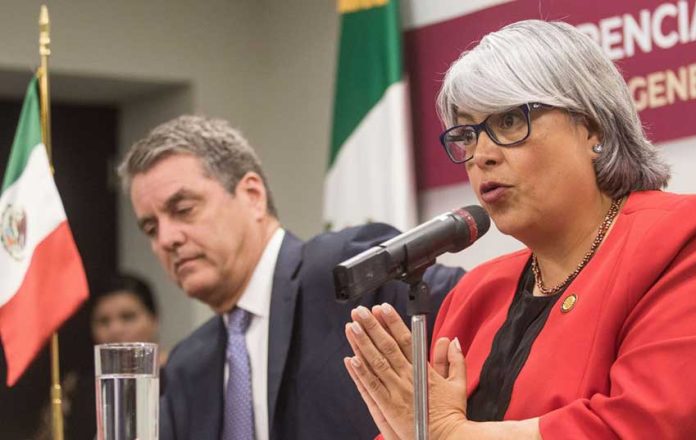Trade and migration are separate issues, the federal economy secretary said yesterday in response to United States President Donald Trump’s threat to impose tariffs on Mexican auto imports and close the U.S. border if Mexico doesn’t stop drug and migration flows into the country within a year.
“For the government of Mexico, keeping migration issues and trade issues separate is very important,” Graciela Márquez told a press conference.
“The United States government sometimes mixes the two issues but for us it’s very important to keep the ratification of the USMCA [United States-Mexico-Canada Agreement] in one lane and issues that have to do with migration in another,” she added.
The economy secretary said that any move by the United States to impose new tariffs would have to be discussed “within the terms of a relationship between trade partners that are modernizing a trade agreement.”
Former president Enrique Peña Nieto, Trump and Canadian Prime Minister Justin Trudeau signed the USMCA deal in November but it won’t take effect until it has been ratified by the legislatures of all three countries.
Márquez’s position was supported by the director general of the World Trade Organization (WTO), who appeared alongside the economy secretary at yesterday’s press conference.
“[Trade and migration] are two different things. They are matters that are on the bilateral political agenda of Mexico and the United States, of course these matters will be discussed but from the perspective of the WTO, what we want is a minimum of turbulence, a minimum of ruptures in economic and trade relationships between countries and that’s what we’re working on,” Roberto Azevêdo said.
However, Trump said earlier this week that while “trading is very important . . . security is what is most important.”
This morning, he reiterated his tariff threat in a series of posts on Twitter in which he also said he was considering an additional economic penalty to deter the flow of illegal drugs from Mexico into the United States.
“. . . Mexico, for the first time in decades, is meaningfully apprehending illegals at their southern border, before the long march up to the U.S. This is great and the way it should be. The big flow will stop,” he wrote.
“However, if for any reason Mexico stops apprehending and bringing the illegals back to where they came from, the U.S. will be forced to tariff at 25% all cars made in Mexico and shipped over the border to us. If that doesn’t work, which it will, I will close the border,” Trump continued.
“This will supersede USMCA. Likewise I am looking at an economic penalty for the $500 billion in illegal drugs that are shipped and smuggled through Mexico and across our southern border. Over 100,000 Americans die each year, so many families destroyed!”
According to Kenneth Smith, a trade official who headed up Mexico’s technical negotiating team in trilateral talks with the United States and Canada last year, Trump’s tariff threats are nothing more than bluster that is politically motivated.
“[Trump] has no basis to argue that he can increase tariffs. Firstly, because if he increases them . . . he violates WTO rules, he violates the existing North American Free Trade Agreement,” he said.
Smith added that if Trump used Section 232 of the United States Trade Expansion Act to impose duties on cars on national security grounds – as he did with steel and aluminum last year – side letters that were agreed to during last year’s trade negotiations to protect Mexico and Canada from such tariffs would immediately take effect.
“. . . He would have to exclude us, there is no way to justify the imposition of a 232 measure,” he said.
Source: El Financiero (sp) Reuters (sp)
